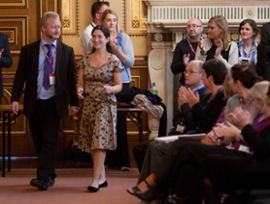Summary
- Ohio's governor has expressed his opposition to legalizing iGaming, pointing out his concerns specifically with online casinos.
- The governor worries that legalizing this sector could lead to reckless gambling and increased addiction.
- Governor DeWine approaches the decision to veto the online gambling bill with caution, yet he seems poised to ultimately reject the push for legalization.
With the surge in sports betting taking the spotlight, there's been a more measured yet persistent push to establish legitimate online casinos. While many of these attempts have stumbled along the way, a few are breaking through, steadily making progress.
Ohio’s governor voices firm opposition against online casinos
Ohio presents a significant challenge for online casinos, not just due to cautious lawmakers, but largely because of a daunting barrier: Governor Mike DeWine has recently made his stance clear, expressing strong opposition to any online casino measures. His message was straightforward and his reasons, compelling. Allowing round-the-clock access to casinos for everyone, in his view, poses substantial risks. Handing a casino to anyone at any hour is, I believe, a poor choice, DeWine stated, concerned that it would exacerbate gambling addictions and lead to more misery. While he strongly opposed proposals moving through the legislature, he was uncertain about deploying the veto. Yet, the possibility loomed large. He admitted to rarely invoking the V word, but confessed his firm stance against online casinos. However, not everyone agrees with the governor. Representative Brian Stewart, a legislative sponsor, views this differently. He argues that since Ohio already embraces various forms of gambling—whether it's slots, table games, or online—a gateway to online casino games is a natural extension. Beyond considerations of consumer protection and addiction, another pressing issue is whether Ohio is truly prepared to support online casinos. The state's land-based casinos thrive on bustling foot traffic, heavily relying on people walking through their doors.
No, online casinos will not hurt land-based footfall
Despite widespread fears, industry insiders assure us that these concerns are largely exaggerated. Ryan Soultz from Boyd Gaming, a company operating 28 properties across 11 states with online casinos, has confidently stated to lawmakers that their performance remains unscathed. Soultz emphasized that innovation should be embraced, not stifled. If online casinos had any detrimental impact on traditional casinos, Boyd would be among the first to resist. Yet, the challenges of addressing addiction and related social issues are undeniably more complex. Although the National Council on Problem Gambling reports a decrease in players overspending, some still worry about the potential widespread impact of legalized gambling.





























